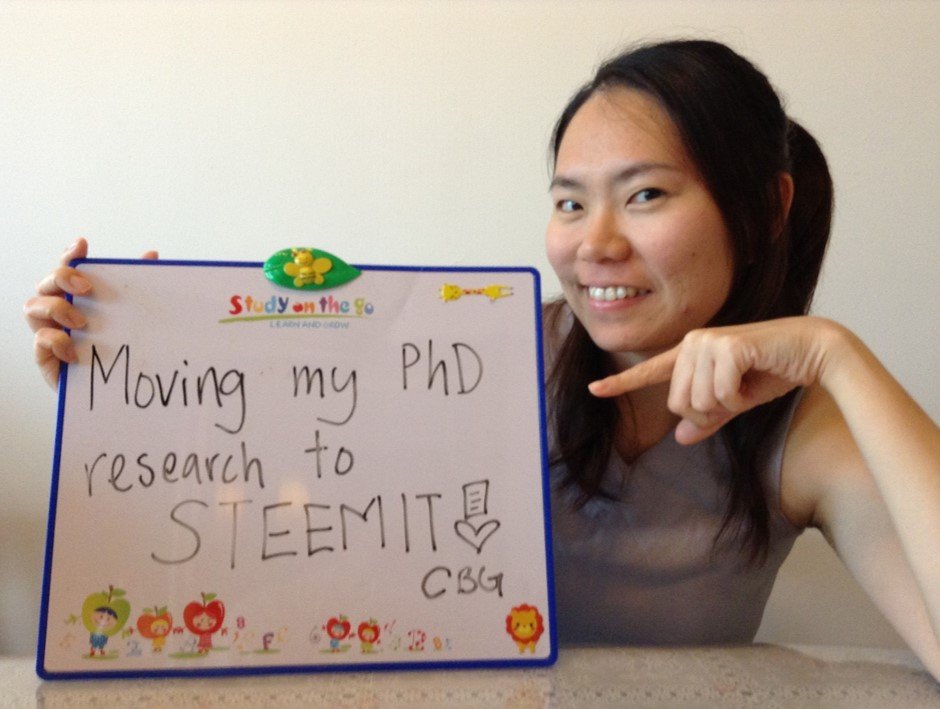Hi Steemians! I have always wanted to translate one of my posts on moving my PhD research to Chinese Mandarin. Decided that this is the time and with the help of @deanliu who has been active in the chinese community, he has helped to translate most of the article. Please note that this article is translated to Chinese Mandarin (traditional) and not Chinese Mandarin (Simplified). (Just a little note on the difference for non-chinese speakers: Chinese Mandarin (traditional) is used in Taiwan and Hong Kong while Chinese Mandarin (Simplified) is used in China, Singapore, Malaysia, etc.)
60% of steem dollars from this post go to @deanliu for thanking his help in translating, contributing to science and cn community.
大家好 !我一直想把我的其中一个文章翻译成中文。 決定這是時侯了!这次和 @deanliu 一起合作。@deanliu 一直活躍在steemit cn社區里。這篇文章的大部分是他帮忙翻譯了。 為了感謝他的帮忙,对于科學和 cn 社區里的贡献, 這篇文章得到的steem dollar, 60%会轉给 @deanliu

Hi Steemians! I am moving my PhD research to Steemit!
Steemit的朋友們好!我決定要把我的博士研究移到Steemit上了!
Hello steemians! Ok, truth to be told, I am going to dropout from my phd soon. Personal circumstances did not allow me to continue with the research. Yet, I still remain in love with what i am doing, so much so i decide that I am going to continue my independent research. And i decide to share my research results with the Steemit community some time in the future with some fine-tuning in the depth of posts. There are a few reasons why I am doing this.
你好,Steemit社區的各位朋友們!我來自新加坡,正在念博士;不過,老實說,我可能很快就會休學了,這是因為種種的個人因素,迫使我不得不暫停自己的博士生涯。不過,由於我還是非常熱愛我的研究議題,所以我決定繼續進行獨立研究,而且我也決定未來將在Steemit這個平台上,持續跟大家分享我的研究成果,當然我會適度調整文章的艱難度,讓更多人可以吸收。以下是我為什麼這樣做的幾個原因。
Current landscape in academia and why it is a problem/當前全球學術圈的生態以及其中的問題
First, journal publications are very expensive - can be anything from USD10,000 per year and USD 10 - USD 30 per journal paper depending on the field. These journal publishers have increased their annual subscription every year but most university library budgets are not growing at the same rate. Hear this - In 2015, the academic publisher Elsevier earned about $1.58 billion in profit or about $9.36 billion in revenue. In fact, they are earning much more than Facebook or International Banks of China. With access to internet and free peer reviews, we would expect that the costs of journal publishing should go south. But it seems that this is not the case.
首先,學術性期刊訂價過高,常常一年的訂閱費動輒超過1萬美元,以單篇期刊論文計算的話約10到30塊美元(視領域而定)。這些期刊出版商會每年調高訂閱費用,但是大部分大學圖書館的預算卻未能同步增加。給個數字,2015年,著名的學術出版社Elsevier的營業額是93.6億美元,而淨利是15.8億美元! 這是非常驚人的數字,代表他們的淨利比Facebook還要多,淨利率比世界最大銀行-中國工商銀行還要高! 在互聯網蓬勃發展以及免費的同行審查越來越多的情況下,你會以為學術期刊成本將被迫逐漸調降,但事實上卻不是這麼回事。
This problem is so severe that even ivy league universities find this hard to swallow. If Harvard university can no longer afford to pay, I wonder how other universities researchers in developing countries are coping with the limitation of literature. And indeed, it was the similar predicament that lead Alexandra Elbakyan, a Kazakhstan university student to create Sci-hub. This lead to a lawsuit from Elsevier to Sci-hub and Alexandra Elbakyan. An article here did some research using Sci-hub traffic data and found out that in fact, Sci-hub users are scattered all around the world, even in the States.
這個趨勢的嚴重程度連美國的長春藤盟校都已經快無法忍受了,我不禁懷疑,如果連哈佛大學這樣的學校都無法負擔,那發展中國家那些大學們要如何面對文獻受限的問題?也就是這樣的困境,讓Alexandra Elbakyan,一位哈薩克大學的學生,在2011年以學術界羅賓漢(但是位女士)之姿創立了Sci-hub,目前為止最大型的學術論文盜版網站;這也導致Elsevier向Sci-hub與Elbakyan女士提出了法律告訴。這裡有篇文章研究了Sci-hub的流量資料後得出結論:Sci-hub使用者遍布全球,其中也包含美國。
This situation has led many researchers to break the copyright law. But they did it with the underlying good intention to seek for relevant literature because they were blocked by publishers' desire for more profits. The way that scientific knowledge is monetized in the modern day today for more profits at the expense of scientists doing good for the improvement of humanity is beyond me. Putting a price tag on knowledge which is explored and created by scientists, and then asking scientists to pay for their own work. Something here surely does not add up.
這樣的狀況,導致了全球許多研究人員被迫違反保障知識產權的法律,但這些研究者只是為了突破出版商出於追求更高利潤而築起的文獻高牆,基於良善的動機,來尋找更多與其研究相關的參考文獻。我實在無法理解,在現下這樣的時代,科學知識竟然還被貨幣化來尋求私人更高利潤,阻礙了科學家們為人類探求更美好未來的努力?科學知識來自於科學家們的探索與創造,但出版商貼上價格標籤後,卻高價向科學家們兜售他們自己的作品?這樣的情況是不對的。
We need an alternative model for research dissemination./我們需要另一種學術知識與研究的散播模式
Importance of knowledge decentralization and management/知識去中心化與管理的重要性
In a post by @anwenbaumeister, she talked about steemit’s potential for decentralization of knowledge. I believe that steemit with huge potential for knowledge decentralization, can draw power away from exorbitant journal publishers and return this power back to scientists, the knowledge explorers. Knowledge should not be managed by centralized publishers. Steemit and steem blockchain can be a potential alternative model for scientists to contribute their work directly for impact and influence. Imagine an awesome knowledge center to collect and spread valuable knowledge and information. A centre for academicians to illustrate expertise, debate and discuss.
在Steemit上,@anwenbaumeister 曾經提過Steemit在知識去中心化方面的潛力。沒錯!我認為Steemit在這方面的潛力極大,可以把掌控權從高姿態的期刊出版商手裡取回,交回真正從事知識探索的科學家們手上。知識不應該是由集中化的出版商來掌控與管理,Steemit與Steem區塊鏈,可以是科學家們如何推廣自己的研究並尋求社群影響力的另一個解決之道。想像一下,一個收集並傳播有價值知識與訊息的去中心化式的知識中心,一個讓學術研究者展示自己的專精研究,並且能夠與同行辯論與討論的美好園地!
How steemit can be a knowledge centre even for layman/Steemit怎样可以是芸芸大眾的知識中心
I am not asking Steemit to award me with a PhD. But I would like to show what I am doing here is an example of how not only valuable knowledge can be decentralized, such knowledge can be managed. This also includes the communication channels of your research. At one point during the last 2 years of my PhD, i wondered if my mentor ever read the things i wrote. And then i realized there will just be 3 people reading my PhD thesis. That will be my mentor, the examiner and maybe my husband. That was also when i noticed that more people are reading my blog than my phd thesis. That is fully understandable. I mean who wants to read a 30,000 word long and boring thesis unless they have to. BUT, if the thesis were to be transformed into information readable and useful for the layman, i can imagine that piece of information delivering more impact for the community.
我不是真想讓Steemit頒給我一個博士學位,只是想以我自己的例子來告訴大家,有價值的知識要怎麼去中心化,又同時能夠好好管理這些知識本身,以及與他人交流的管道。在我讀博士期間,我曾經一度懷疑我的導師是否真的讀過我寫的論文,最後我的結論是只有3個人會讀,我的導師、審查的教授,還有或許我先生也會看。當時,我也意識到讀我博客文章的人數,要比讀我論文的人多得太多。當然這一切都可以理解,除非出於必要,誰會願意去看3萬多字的枯燥論文?但是,如果論文能夠改寫成可讀性高、對於一般人比较看得懂和可能有用的文章,那麼學術性論文就有可能對於更廣的閱覽大眾具有更大的影響力!
People in niche expertise may agree with this:- it is harder to communicate your research to layman than to your peers in the same field. I have been blogging passionately about design thinking at steemit, pretty much in layman terms. I hope that my effort can give steemit and steemians added value in terms of knowledge sharing and intellectual discussion.
具有專業知識的人可能會同意,與同領域的專業同行相比,要向一般人解釋自己的研究實在十分困難。過去幾個月,我非常興奮地在Steemit上面跟所有人分享、介紹關於設計思考(design thinking)的議題,也使用較淺顯易懂的文字,希望這些努力能為平台與所有使用者帶來價值,包括知識的分享、學習與討論。
Appeal to scientists: Join us
呼籲科學家們:加入我們吧!
Join steemit and be part of this awesome wave! Try it. If you do blog about your expertise, be it economics, science and engineering, social sciences, please tag as #academia so that i can follow you. Waiting for you. :-)
首先你要加入Steemit這一個神奇的平台,然後,根據你的專業,寫些淺顯易懂的知識性文章,可以是經濟學、科學、工程或社會科學等領域,請記得使用 #academia 這個tag,那麼我就可以找到文章並追蹤你。滿心期待你的加入,一起改變世界!
P/S: Thanks for the positive response. Would like to raise awareness on the #pevo project which i am part of. See @pharesim's post here Also see https://pevo.science/
P/S:謝謝所有正面的回應,同時也希望宣傳一下我有參與的 #pevo 計畫,請看@pharesim 這裡的文章 以及https://pevo.science/
Original post: https://steemit.com/academia/@coinbitgold/hi-steemians-i-am-moving-my-phd-research-to-steemit
